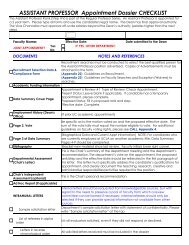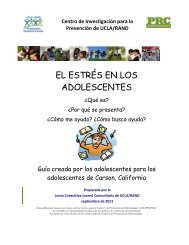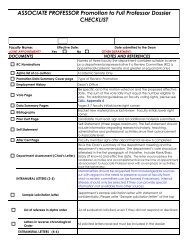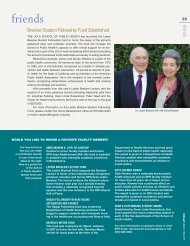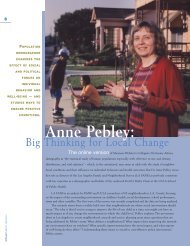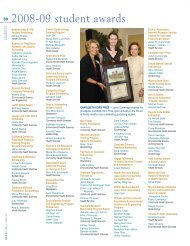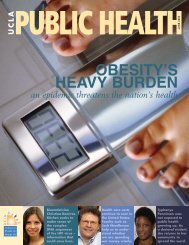JUNE 2001 - UCLA School of Public Health
JUNE 2001 - UCLA School of Public Health
JUNE 2001 - UCLA School of Public Health
You also want an ePaper? Increase the reach of your titles
YUMPU automatically turns print PDFs into web optimized ePapers that Google loves.
Disadvantaged Groups Less Likely<br />
to Get State-<strong>of</strong>-the-Art HIV Treatment<br />
HIGHLY ACTIVE ANTI-RETROVIRAL THERAPY (HAART), the state <strong>of</strong> the art<br />
in HIV treatment, is less likely to be used by certain socioeconomically disadvantaged<br />
groups, according to the latest findings to come out <strong>of</strong> a large national<br />
research consortium based at <strong>UCLA</strong> and RAND. The recent study, headed by Dr.<br />
William Cunningham <strong>of</strong> the <strong>School</strong>s <strong>of</strong> <strong>Public</strong> <strong>Health</strong> and Medicine, found that<br />
the major factor predicting lower use among populations was lack <strong>of</strong> insurance<br />
coverage.<br />
HAART, the drug cocktail that contains protease inhibitors, has been shown<br />
in other studies to improve health outcomes among people with HIV.<br />
Cunningham’s group found that by the end <strong>of</strong> 1996, the year protease inhibitors<br />
became widely available, 37% <strong>of</strong> patients reported that they had<br />
taken the medication. Interviews with the same patients in<br />
January 1998 found that 71% had ever been on the medication.<br />
But the proportion <strong>of</strong> patients still taking HAART at the time <strong>of</strong><br />
the second interview was only 53%.<br />
Moreover, certain groups were least likely to be taking the<br />
drug combination: African Americans, drug users, women who<br />
contracted HIV through heterosexual contact, people with less<br />
education, the uninsured, and those covered by Medicaid. While<br />
insurance was the key determinant in this study, another study by<br />
the group identified other barriers to HAART use, including transportation<br />
and having competing subsistence needs. “Ins<strong>of</strong>ar as<br />
there are non-clinical explanations for these disparities, this fits a<br />
pattern we have observed both in HIV and in other diseases, in<br />
which the most socioeconomically disadvantaged groups are not<br />
getting the best treatment,” Cunningham says. His group is now<br />
studying the effect <strong>of</strong> these differences on outcomes, and examining<br />
interventions that could address the problem, including the<br />
use <strong>of</strong> case managers to ensure more coordinated and comprehensive<br />
care.<br />
The research is part <strong>of</strong> the HIV Cost and Services Utilization<br />
Study, in which a national consortium <strong>of</strong> investigators, funded by<br />
the federal Agency for <strong>Health</strong>care Quality and Research, has been examining<br />
HIV/AIDS health services. Cunningham has led the access section along with Dr.<br />
Ronald Andersen, Chair <strong>of</strong> the <strong>UCLA</strong> <strong>School</strong> <strong>of</strong> <strong>Public</strong> <strong>Health</strong>’s Department <strong>of</strong><br />
<strong>Health</strong> Services.<br />
Strong Ethnic Identity Among African American<br />
Women Is Linked to Good Mental, Physical <strong>Health</strong><br />
A <strong>UCLA</strong> SCHOOL OF PUBLIC HEALTH STUDY EXAMINING the relationship<br />
between obesity and depression in African American women links, for the first<br />
time, good mental and physical health with strong feelings <strong>of</strong> ethnic identity.<br />
The study, supported by a National Cancer Institute grant and published in<br />
Preventive Medicine, surveyed 429 Los Angeles women from a culturally tailored<br />
program promoting healthful eating and exercise. The research team, headed by<br />
Drs. Antronette K. Yancey and Judith M. Siegel, found an inverse relationship<br />
between depression and strong ties to the African American community, independent<br />
<strong>of</strong> other demographic and health factors. Their survey found the lowest<br />
levels <strong>of</strong> depression among women with strong ethnic identity and less excess<br />
weight.<br />
continued on next page<br />
PERCENTAGE OF AFRICAN<br />
AMERICANS AND WHITES WHO<br />
EVER RECEIVED HAART<br />
20%<br />
DEC 1996 JAN 1998<br />
African Americans<br />
47%<br />
Whites<br />
59%<br />
78%<br />
7<br />
research <strong>UCLA</strong>PUBLIC HEALTH



